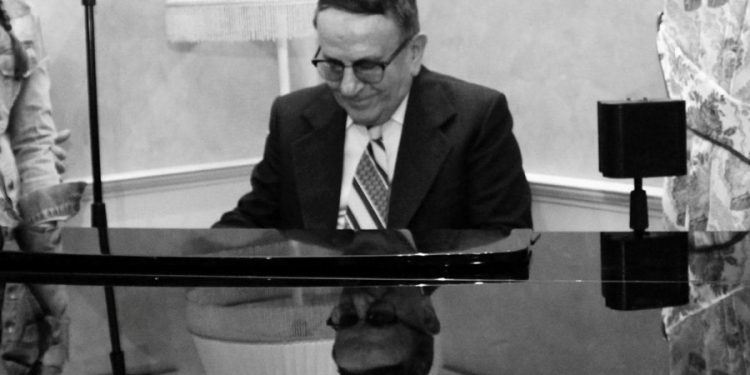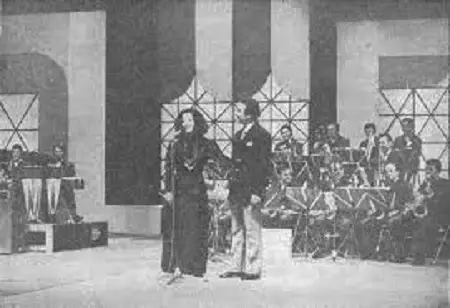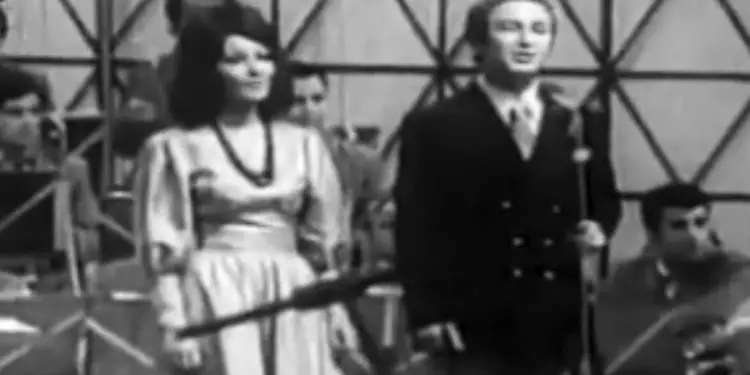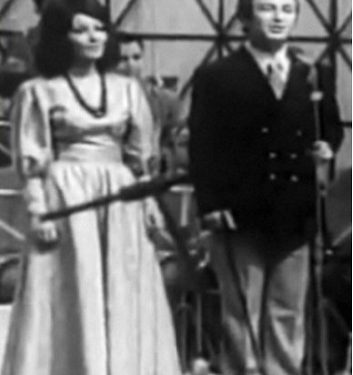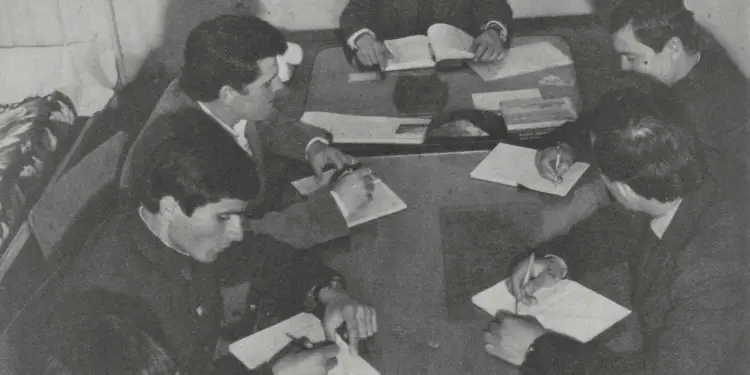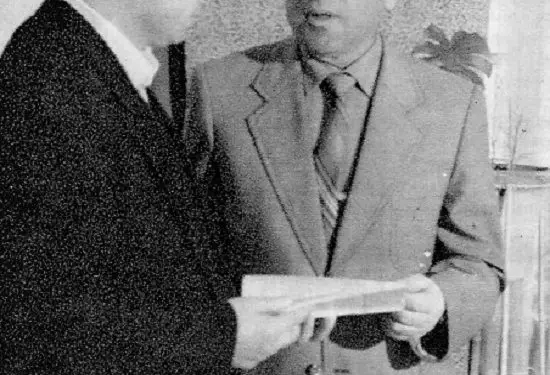By Elisabeta Ilnica
Memorie.al / Making songs like “Lemza” or “Cafe ‘Flora'”, during the years of the communist dictatorship of Enver Hoxha and his successor, Ramiz Alia, even when it seemed like the winds of liberalism were blowing, was like looking for trouble with any condition. Such was the composer Agim Krajka. On festival platforms, two songs were assigned to the party, one to the working class, one to the peasantry… and a good pop song. The latter was assigned to Krajka, but with him it was impossible to win first prize. During his career, he won a total of 18 second prizes and, when he won the first, in 1987, he couldn’t believe it. He wanted to drink something strong, to shake…!
Difficult times, creators had to work under conditions of extraordinary censorship and self-censorship, no one trusted anyone, artists were looked down upon…! For all this, as well as for collaborations with singers, such as the Libohova sisters or Lindita Theodhori, (which has been put at the center of an open debate by the singer-songwriter Gjergj Leka), Agim Krajka tells in an interview, which we are publishing in this article .
In addition to his career, he also talks about his acquaintance with his wife and his relationship with his grandmother, to whom he dedicated his first composition, the famous song, sung by Vaçe Zela.
Mr. Krajka, how would you rate the singer Lindita Theodhori?
In vocals, he was very good, but you had to know how to highlight the vocals for Lindita.
When Lindita sang for the first time at the festival, at the age of 17, she came out with your song “Cafe ‘Flora’, full of men”. Did you adapt the song to her vocals, or was that just a coincidence?
I adapted the song “Flora coffee, full men” for Lindita. I studied her vocals and she sang it extremely beautifully. He got the second prize and the next day it was taken away. They took it from me, but the people loved it. That I made the songs that the youth liked a lot and I gained this characteristic, since I made the song “Lemza”, which Vaçe Zela lifted up.
The song “Cafe ‘Flora’, full men” received a lot of applause and there was even talk of the first prize. They barely gave second prize and after canceling that too, I ate it too.
That it was the 11th Festival on Albanian Radio-Television, when it became a disaster for many artists. They arrested a lot of singers, the musicians of the manager, they were fired, etc. Fortunately, I survived, although not without consequences.
How did you manage to escape?
A few days after the festival, a young man came to me at the Opera and said: “You are Agim Krajka”? “Yes”, I say. “At 12:00, the head of the Branch is waiting for you. We are waiting for you at the Department of Internal Affairs”, he replied.
Not only was I scared, but I was excited and I said: “The hell knows what will happen to me now”. I thought I’d drink a glass of fërnet to cheer myself up. I went to the head of the Internal Branch at 12:00 p.m.
I don’t want to say his name. The vice president was also there. As soon as I entered, he said to me with a terrible shout: “Where are you, you who abuse the youth! What is this song more, ‘Cafe Flora, men full?! What are these songs? “No, take it, comrade chairman.
That’s Pogonishte’s song”, I told him and started the melody by mouth: “Na, na, na, ni, na ‘Kafe Flora, full men’, paru pau, etc.”. “What is Pogonishte, brother?” Did you hear that? What is that parupau”, he said to the vice-president, who was sitting there and did not make a sound.
“It was an empty time and we took advantage of the melons,” I told them. He told me: “Listen here. He sees these, and he showed me the hand irons. I would have put the bars in place, but if I put them on you, first I will put them on my reeds, who sing this song all day long, and the reeds of my street.
But go, go, because we have our son, we also gave you school”. I didn’t make a sound, but I escaped. But for ten years, I was in total isolation and only second prizes were awarded to me, until 1987, when I won the first prize.
What happened to Lindita Theodhori who sang “Kafe Flora, full of men”, was she punished like you?
Lindita did not pay, as I did. Because with me, they couldn’t wait for it, since I had allegedly degenerated the music, since the song “Lemza” and “Djaloshi dhe shiu”. As for Lindita, she played the role of the victim, who took my song, so there were no consequences.
As you said above, you have been awarded second prizes repeatedly, 18 of them, excluding the year 1987, when, finally, you received the first prize…?!
Eh, it was the matter of an oriented platform. Simon Gjoni, was the head of music on the radio. He was a great musician but died young. He told me: “Come on, Gimo, it’s becoming the platform of the festival.”
Of course there was an oriented platform, that we want, for example, “two songs for the working class”, one for the peasantry, one for the party, etc. and “a good song of light music”. And Simon Gjoni, for the latter, who was on the side of this platform, said: “Agim Krajka should do this”.
So, there was also an orientation, that these songs that I made were liked. The songs of our generation were eagerly awaited by the youth, because the youth of that time had its own language of music. It was not a closed youth.
There was a young man who listened to Celentano and it was not easy to rate our song. However, the public gave me the award. The song “Hiccup”, “Djaloshi d shiu”, “Cafe ‘Flora’, full men”, etc., received many applauses from the hall.
They gave me second prize, but even that was taken away from the broadcast the next day, as happened with these songs, which I mentioned above. Then they gave it again, months later, whether the rulers wanted it or not, the people loved those songs and sang them at work and at home, everywhere.
I have received 18 second prizes, which for me were first prizes. For me, seeing how much the people loved them, it doesn’t matter to others.
Have there been undeserved awards at festivals?
I think there was not.
And you just told about yourself, that they didn’t give you the first prizes, but only the second ones, and they even took them away from you…?!
Yes, so they gave me the prizes and then they took them away from me. Those who won the festivals of that time, I think they deserved the awards. For the juries, I received only one first prize, in 1987, with the song “Nuk e harroj”, sung by the sisters Irma and Eranda Libohova, while for the people, who kept the choruses on their lips, I believe I received full first prizes.
What about Irma Libohova, what kind of singer was she?
I worked a lot with Irma. It’s not just merit if you have vocals. The point is, as a singer or singer, knows how to use this vocal and Irma was the master of it. I kept her close for many years, making songs that fit her.
From year to year, Irma made progress, worked hard. Then one day she brought me her sister, Eranda, and I started writing about both of them. At the end of the 80s, they caught the eye even more, but keep in mind that there was neither Vaçe nor Parashqevi anymore…!
Without Vače and without Parashqevi, were the roads to get an award easier?
The jurors got used to me too. From the 60s-70s, there were no longer those “fears”; that I was degenerating youth, or that the music was more rhythmic than it should be, etc. Meanwhile, I finished the Conservatory for composition, with the giant of music, Česk Zadeja. They began to withdraw a little as party members. While jealous then, it was the musicians who had positions. They looked at me with a kind of cynicism and used the posts to hit me.
How were the relations between the composers, was there more solidarity or rivalry?
At that time, everyone was trying to develop their own style. There was rivalry, but it was a silent rivalry, of the type: “Why should he make the song better than me, it’s my own fault”?!
And these kinds of thoughts pushed composers to create even more beautiful songs. So it was a spirited rivalry. When I received the first prize, they knew it would be given to me.
And look what they did to me. The director of the Opera takes me to Rrëshen. He tells me: “The Ensemble is left there and you have to go and help them, because that violinist is sick.” I left early, to Rrëshen, with the cars I found, “Zis” and trucks.
That night the awards were to be given, but I had nothing to do. Neyse, I barely arrive in Rrëshen and start asking about the Ensemble. They say to me in amazement: “No, sir, what do you mean by Ensemble?” No Ensemble has come”.
It was afternoon in the meantime and let’s go back to Tirana, consider how the means of travel were at that time. I rode a piece of road on a tractor, then on a truck and barely made it home for dinner. When I walked in, it was just when the festival awards were being given.
As always, I was used to waiting for the second one, but I look forward to the third one, never the first one. At that festival, i.e. in 1987, 3 third prizes, 3 second prizes and 1 first prize would be awarded. Gone are the first three prizes, it wasn’t my name. I thought for sure that I would be in the second prizes.
When the second prizes were awarded and I was nowhere to be seen, I was upset to say that I had been left with nothing at all. When the announcer finally announces: For the first time, the award is given to the composer Agim Krajka, with the song “Nuk e harroj”, sung by the Libohova sisters and others.
I can’t tell you what happiness I experienced. I had a crystal vase on the table, which I had bought once in Istanbul, I took it and broke it. I wanted to celebrate, drinking something, but I had nothing. Then I took alcohol and diluted it with water, and we started drinking it.
Then, from 12 o’clock at night, my doorbell rang and a graduating class from the gymnasium came to my house, hands full of drinks. We celebrated until the morning, drinking and listening to music on the tape recorder. It was the night of my life.
Why have women mostly won the first prizes at the festival?
The composers were all men. And if we were to try any man, whether he has a voice or no voice, we would rather try the women. It is human to accept this and it has had quite an impact, the selection of composers over female singers. Because having the ambition to win any prize, the woman had more chances.
Because, apart from the voice, it is known that women have the gift of God and many other “accessories”, they were freer on stage, more smiling. So if they had vocals and these other elements that I mentioned, women had more advantages to win than men.
And composers, why were there only men?
The composition school opened late. However, it was not a practical branch for women, that the composers went to play some music in the basements, took the singers home, to make the songs, etc. So it was mostly a male profession, with all its risks.
How much has the State Security infiltrated the artists?
The State Security had the artists, just like the saboteurs. Everyone was monitored. Because the artist was the only means of infecting the people.
Were there artists recruited by Sigurimi?
The artists themselves know that. However, we measured each other when we talked to each other, except for confidential friends, who had known each other for years and sometimes burst out.
You went abroad several times during the communist regime. Not tempted to stay there?
I saw 5 continents at that time, but it never occurred to me to stay. I loved my family very much and I didn’t want to lose them anymore. Even, once in a dream I saw, as if the Ensemble had run away and they had left me. I woke up in a daze and Panajot Kanaçi got scared and asked me what was wrong with me. I told him. He laughed and said to me: “Here we are both, sleep comfortably.” So, even in my dreams, it didn’t occur to me.
And in 1989, why did you sit?
Because it was another thing, liberalization had started. Then I took my family with me. We lived in America for 17 years, before finally returning to Albania.
How was getting to know your wife Semiramis, or Ami, as you call her?
She was young, she was 16 years old. Attended the Artistic Lyceum. One day I was leaving Radio-Tirana, this one from Liceu, with some friends and laughing. I looked at it and said to myself: “Damn, what a good job.” When Ami joined Radio. I started to get interested.
Ami played the viola there. Yes, at Radioja we were obliged to always leave our passports there. One day, after finishing work and waiting for Ami at the counter, the woman at the counter tells us: Gimi, you don’t have your passport. Ami didn’t have it either and was looking for hers.
I started to harass Ami: “Don’t do any of my work, they have our passports in civil status and celebrate us.” She got very confused and hurried away, leaving the passport job. Then I started looking for it.
It was the night of May 1st and the square was full then. I went out to see if I could find it. I had put a double in the frame. I found her among her friends and grabbed her directly by the hand: “Come, I have a word with you.” She said; “Wow”, wow”, while her friends, laughing, told her; “Go, my go”.
I took him to the Central House of the Army, and Ami, timid and still not recovering, asked: “Whoa, what did you do?” “I know you like me a lot,” I told him. She still tried to say something, but I grabbed her and kissed her hard. He ran home and told his mother: “I’m going to get engaged to Agim Krajka, because he kissed me.”
Her mother calmed her down and then came the engagement and marriage, but not only because I kissed her, but because I loved her and she loved me. We have been blessed for life and have two sons, both of whom are engaged. They finished piano and are making their music and fame outside of Albania. Memorie.al




